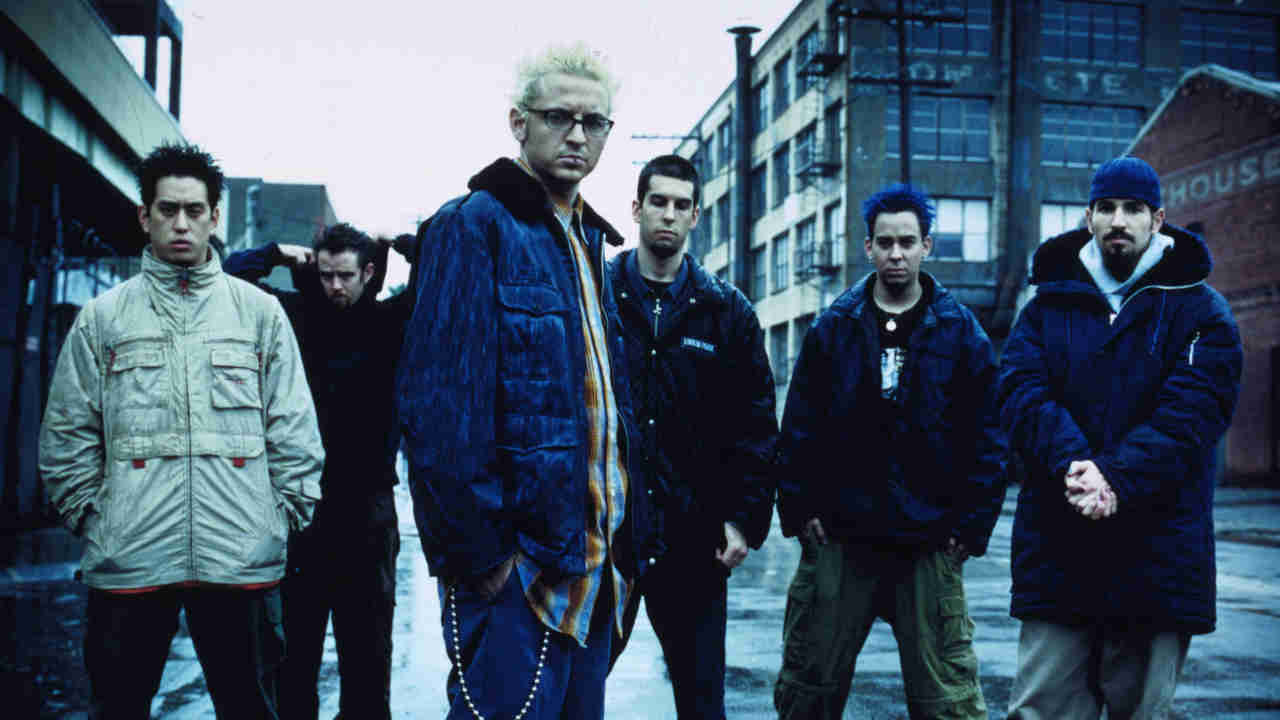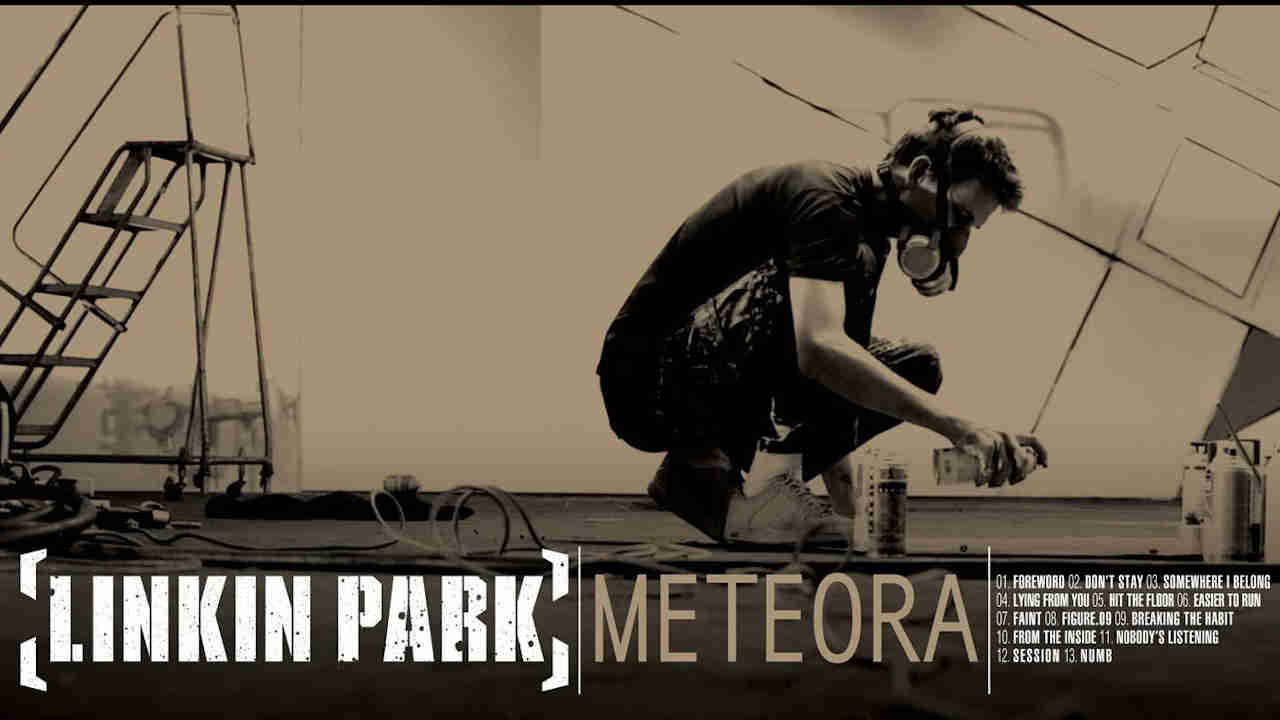By the end of 2002, Linkin Park were well on their way to being one of the biggest bands on the planet.
Their debut, 2000’s Hybrid Theory, had ushered in a new frontier for heavy music. Mashing together jagged metal, hip-hop, cutting-edge electronica and irresistible pop choruses, it was instrumental in making nu metal an unstoppable force and, in 2001, would be the best-selling album in the world. Talk about setting a high bar…
“They were rock stars at that point,” Hybrid Theory producer Don Gilmore recalled to Billboard in 2017. “How are they going to follow that up?”
Linkin Park answered that question on 25 March 2003 when they dropped their second album, Meteora. Ushering in a more refined version of the band, the melodies were bigger, the performances tighter. Meteora replaced the fresh out-the-box intensity of their debut with a polished sound that was far grander in scope. It wasn’t the game changer that Hybrid Theory was, how could it be, but it’s still viewed as a modern rock classic.
The six-piece had started meticulously piecing together the songs in the back of their tour bus as they trekked across the US on the 2002 Ozzfest Tour, before continuing in rapper and songwriter Mike Shinoda’s home studio. Already renowned as a band who favoured the hard graft over hard partying, they took their pain-staking approach to songwriting to the next level during the writing sessions.
“For the track, Somewhere I Belong, we tried 40 choruses,” Mike Shinoda told Spin Magazine in 2003. “It was just agonizing—you can’t even imagine writing ten, and we were writing the tenth one, and in our minds, it was done. And people would come in and say, ‘Yeah, it’s cool.’ and that’s not the response you want. You want, ‘That’s the greatest thing I’ve ever heard!’ In our heads, we were thinking, ‘Damn it—we gotta go on writing.’”
By August that year, they’d written 80 songs, whittled it down to 13 close-to-complete demos and headed into NRG studios in LA where, once again, Don Gilmore helmed the recording sessions.
Meteora landed at a strange time for metal: by the time it hit the shelves nu metal was in the midst of buckling under its own weight. In a crowded scene of copyists, the fresh, innovative sound Linkin Park had premiered two years before now felt tediously familiar. By the end of 2003, Limp Bizkit, who had been the biggest band in the world just three years earlier, had pretty much imploded with their fourth album, Results May Vary, while veterans Korn had plateaued commercially and artistically with their sixth record, Take A Look In The Mirror. Nu metal was all but dead.
Linkin Park’s response? Transcend the genre completely. Hybrid Theory’s anthemic, world dominating single, In The End, had already positioned them as a band who could survive nu metal’s inevitable cliff edge, and Meteora came ready with four singles that were ripe for the mainstream. That year the band became ubiquitous. It was almost imprssible not to turn on the TV or radio without hearing either Somewhere I Belong, Faint or Breaking The Habit. Meanwhile, the monumental Numb would go onto be their defining anthem.

Given the commercial heft of the record, when the 2003 Grammy nominations rolled in, the band unsurprisingly found their name on the list – although the track nominated - eerie instrumental Session, composed entirely of scratching and sampling - was a choice from the leftfield. It didn’t win, although co-vocalist Chester Bennington was unimpressed by the shout-out in the first place.
“I personally feel that this record is better than Hybrid Theory," he told Launch Radio Networks. "I think there are certain songs that definitely exceed the quality of even Crawling. And to not even be nominated for a track that was an album track - I mean it was an instrumental, like an interlude — personally, I'm kind of insulted. I think I'd rather be not nominated for anything than to be nominated for a track that's not even a band track.”
The band’s time would come though, with the band’s 2004’s now iconic collab with rapper Jay-Z, Collision Course. The resulting six-track EP included a towering remix of Numb , that, in 2006 would pick up another Grammy nomination and, this time, it won, the band and Jay-Z taking home the gong for Best Rap/Sung Collaboration. That year they performed the song at the Grammy awards ceremony with Jay-Z and ex-Beatle Paul McCartney, carving themselves a new place in mainstream culture.
Despite Meteora’s subsequent success, initial reviews from critics were mixed, with some complaining that the band had played it safe, cleaving too rigidly to the nu metal template they’d laid down with their debut. Sure, songs like the angst-riddled Don’t Stay and Hit The Floor, picked right up where Hybrid Theory left off, but it’s unfair to downplay Meteora as a re-tread of past victories.
“There was a trust element that was there on Meteora that maybe wasn’t quite there [before…,” remembers Don Gilmore. “But on the Meteora sessions, not so much … if I asked them to do stuff that was outside of their comfort zone, they were fine with going there and trying to find those special moments.”
“We wanted to step outside of the box, so we used some live strings, piano,” Mike told OMH in 2005, of some of the band’s more creative ideas. “We used a traditional Japanese flute [on Nobody’s Listening], which is called shakuhachi. We played with time signatures, different tempos. Songs like Breaking The Habit and Faint are faster than any songs we’ve ever written and Easier to Run is much slower.”
Vocally too, Meteora is Chester Bennington’s strongest statement. After falling sick for five weeks towards the end of the recording process, the co-frontman was forced to record his vocal parts while the rest album was being mixed. Yet he rose to the pressure, putting in a wrenchingly emotional performance on Numb and Easier To Run. In the face of the singer’s death in 2017, the soaring chorus on the latter still hits like a punch to the gut – “It's so much easier to go/ Than face all this pain here all alone.”
While it’s difficult to overstate just how much hype surrounded Meteora’s release, the band have insisted that responding to commercial pressure was a secondary consideration. “It’s like, ‘You sold 10 million records! Do you expect to sell another 10 million records?’ No.’” Chester commented to Kerrang! in 2003. “Would it be nice? Yeah. Is it a reality? No, it’s not.”
Instead, the band focused on something bigger. Hybrid Theory might have been the album won Linkin Park a seat at the table, but Meteora secured them something equally precious - longevity. The album name, Mike explains, was inspired by Meteora, a breath-taking landscape in Greece, where monasteries perch perilously atop rock formations.
“When we saw the name Meteora, we liked it because it was epic and cinematic, powerful and dynamic,” he would later recall. “That’s what we wanted our album to sound like.”
With Meteora they achieved it and more – it’s the sound of a band at the peak of their powers.

